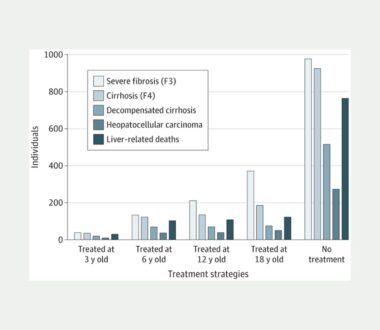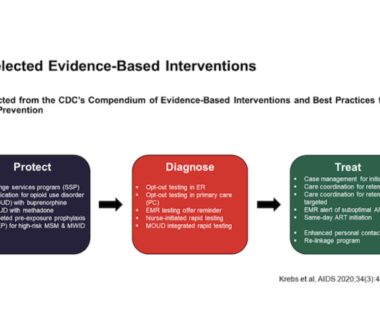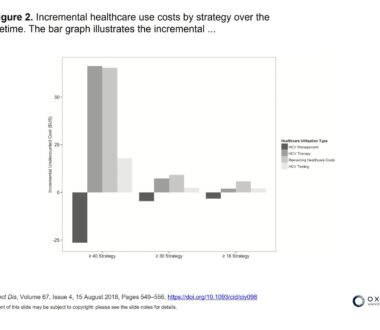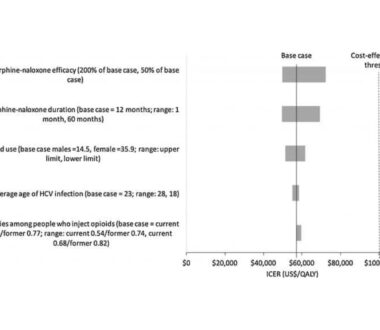
Cost-Effectiveness of Strategies for Treatment Timing for Perinatally Acquired Hepatitis C Virus
Children with perinatally acquired hepatitis C virus (HCV) are now eligible to receive direct-acting antivirals (DAAs), a highly effective treatment for HCV, as early as the age of 3. Despite existing studies demonstrating DAA’s high efficacy and tolerance among adults and children between the 3 and 12 years old, there has been low uptake due […]

Engaging with People with Lived Experiences in OUD Modeling Research
Drug overdose deaths continue to rise in the United States and Canada, with the risks for greater opioid use sharply increasing in Mexico. As modelers, we know simulation modeling is a valuable tool that can inform policies and interventions to prevent overdose deaths and reduce related harms including drug overdose, HIV, and hepatitis C virus […]

Ending HIV in the United States Will Require a Substantial Financial Commitment
“What will it take to end HIV in the United States?” is a pressing question posed by public health officials, researchers, and policymakers alike. Population Data & Modeling Core Director Benjamin Linas seeks to answer that question by amplifying notable results from a simulation modeling study published by researchers at Johns Hopkins. In an editorial issued in the Annals of […]

Dissemination Science to Advance the Use of Simulation Modeling
COVID-19 has brought simulation modeling to the foreground of public discourse, as policy makers and stakeholders project the effects of different interventions to “flatten the curve.” Simulation models allow investigators to tinker with different conditions of the world to observe how they affect future outcomes; however, translating the models’ results to the public can be […]

Modeling infective endocarditis mortality associated with injection opioid use
Injection-related infective endocarditis (IE) is a serious and expensive medical complication among people who inject drugs (PWID). In some states, such as North Carolina there has been a 12-fold increase in injection-related IE between 2007 and 2017. Approximately 1.3% of people who inject drugs report IE within the past year, and between 0.5% and 11.8% report IE […]

Simulation Modeling Presents Opportunities To Support The Public Health Response To The Opioid Crisis In North America
Although there are several evidence-based cost-effective interventions for people with opioid use disorder (OUD), they are underutilized. Questions remain regarding intervention selection, and cost of service delivery. Simulation modeling offers an opportunity to support decision making to address the syndemic of opioid overdose, HIV, and hepatitis C (HCV). In an article recently published in the International Journal […]

Optimizing HIV Prevention in Six US Cities: An Economic Model
In 2019, the United States launched the effort to End the HIV Epidemic by reducing new infections by 75% within 5 years and by 90% within 10 years. This national strategy comes with some new funding for the Centers of Disease Control and Prevention (CDC), the Health Resources and Services Administration (HRSA), and the Ryan White HIV/AIDS […]

Overdose and Re-hospitalization Rates Following Endocarditis Are Lower for Patients Receiving Medications for Opioid Use Disorder
The proportion of hospital admissions for endocarditis attributable to injection drug use increased from 7% in 2000 to 12% in 2013. Endocarditis is an infection in the lining of the heart chambers and valves that can be contracted through shared injection equipment. Rates of endocarditis are disproportionately affecting young people who inject drugs (PWID), which has […]

Methodology Consultation Success Story: Dr. Ashish Premkumar
The incidence of neonatal abstinence syndrome (NAS), also known as neonatal withdrawal syndrome, increased nationally from 3.4 per 1000 hospital births in 2009 to 5.8 in 2012. Recent estimates of NAS cost $1.5 billion dollars with the majority of the financial burden falling to state Medicaid programs. However, pregnancy offers a unique opportunity for women with […]

USPSTF and CDC Recommend Expanded HCV Testing for All US Adults
The US Preventive Services Task Force (USPSTF) released a draft recommendation for hepatitis C (HCV) antibody and RNA screening in all adults ages 18 to 79. This is a departure from their current 2013 recommendation of risk-based screening, including people who inject drugs (PWID), and one-time screening in baby boomers born between 1945 and 1965. The recommendation […]

Care Integration of Hepatitis C and Opioid Use Disorder Treatment is Cost-Effective and Improves Health Outcomes
People who inject drugs (PWID) often become infected with HIV and hepatitis C virus (HCV). While hepatitis C can be successfully treated with medication, care is often fragmented and rarely integrated within one program or setting. Two recent studies by CHERISH researchers modeled economic and health outcomes for PWID and found evidence of synergistic benefits […]
Engage with CHERISH
Submit a Consultation Request or Contact Us to learn more about how CHERISH can support your research or policy goals.